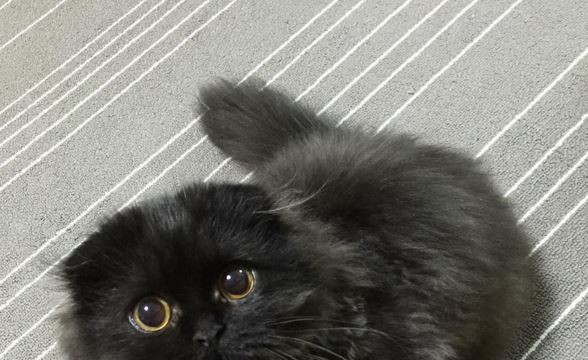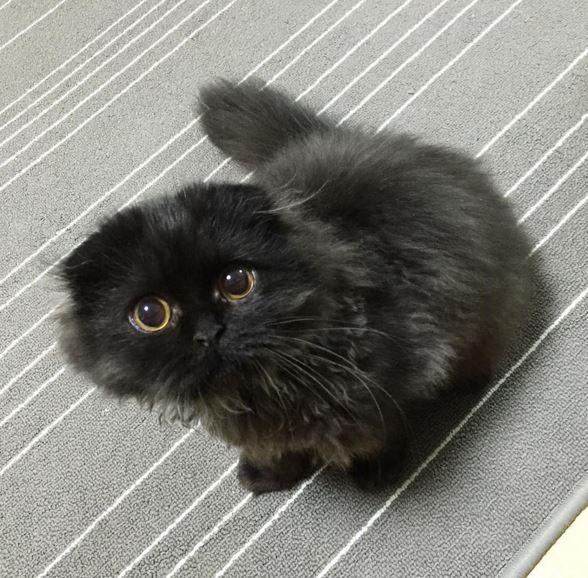Photo by 1room1cat on Instagram
Gimo the cat is pretty cute, right? But he also has some pretty intense eye contact that might be intimidating in an interview scenario. So how do you know what your body language is saying about you in an interview? If you can’t fall back on your cute, furry coat or purr your way into your interviewer’s heart, what are you subconsciously telling your interviewer?
Eye Contact is all over the place, or too intense
Don’t take cues from Gimo the cat here. He seems intent on winning a staring contest. That’s the last thing you want to do in an interview situation. Conversely, never making eye contact with your interviewer can make it seem like you have something to hide or you’re not real confident in what you’re saying. Actively listening when your interviewer is asking you a question, nodding in agreement to show that you understand the question, and making brief eye contact is a good thing. When you start to answer the question, also make brief eye contact, but don’t lock eyes and hold the interviewer’s gaze for your entire answer. It can make both of you uncomfortable! However, if you’re looking at every other corner of the room, glancing behind you at the people who might be in the hallway, or staring out the window, you run the risk of seeming disinterested or unable to focus. If eye contact has been an issue for you before, set up time with a trusted friend or mentor to do a mock interview. Ask them to specifically focus on your eye contact habits and ask for feedback. Understand that you’ll be more comfortable in a mock interview situation, but if there’s something you could be doing better with someone you know, you’ll definitely benefit from putting their advice to work with someone you’re nervous to talk to.
Are you trying to land a plane or have a conversation?
We’ve all had conversations with people who love to gesture. In fact, they gesture way too much. At times, you may have wondered if sitting three feet away from them is far enough because they might get so carried away that they accidently strike you. If you have a tendency to be an animated speaker, picture in your head that you’re actually sitting on your hands. That should provide you with the visual cue to tone down your impulse to act out what you’re saying. There should not be choreography to go along with answers to your interview question, so if the visualization isn’t strong enough to rein in your excitement, put your hands in your lap, interlace your fingers, and keep them there. It should act as a physical barrier to moving your hands off your lap, unlacing your fingers and starting to demonstrate what you’re saying.
Fidget, fidget, fidget
Fidgeting throughout your workday can actually be beneficial. Researchers have found that an unintended doodle can boost memory and attention span. However, fidgeting also happens when you’re bored with a particular task and you’re subconsciously looking for a way to channel some part of your attention. If you fidget at your desk while you’re trying to get inspiration to solve a problem, that’s one thing. Continuously bouncing your leg in an interview is not only distracting, but makes you look uneasy, unsettled and unfocused. Keep the fidgeting to a minimum and you’ll give your interviewer the opportunity to focus on your credentials and skills, not your bouncing leg.
Papers, and cell phones, and keys, oh my!
Whatever you have on your lap, or in your space in front of you when you start the interview, try to clear the area of any distractions. If you pay more attention to something other than the interviewer, you run the risk of looking more interested in your copies of your resume, checking your cell phone, or counting the number of keys you have on your key ring. It goes without saying that your cell phone should be turned off, or you can leave it in your car if you drove to the interview. Your interviewer should be your main focus, not anything you have in your pockets or your purse. Don’t get ruled out for the job because you’re absentmindedly fiddling with something you could have put out of your reach during the interview.
You can’t control everything in an interview, but you can have influence over your body language. A good rule of thumb is to think about is how you would want a candidate to behave if you were interviewing for a job on your team. Avoid taking pointers on eye contact from Gimo that cat, and before you know it, you’ll be asked back to complete a second interview!


